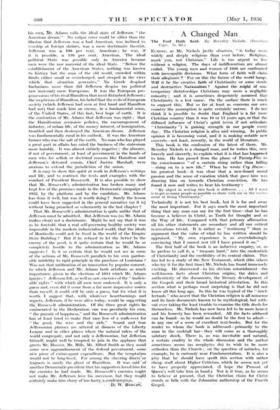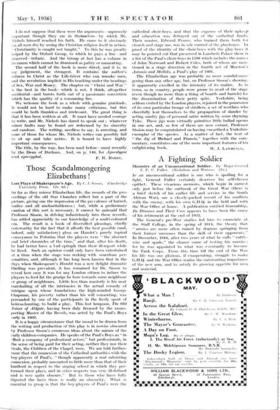A Changed Man .
The -Fool "lath Said. By Beverley Nichols.- (Jonathan Cape. is. 6d.)
ECROPE, as Mr. Nichols justly observes, " is today more widely and deeply religious than ever before. Religious,
mark' you, not Christian." Life' is. tbo urgent to live without 'a religion. The days of indifferentism are almost ended. The Young men and women Of 1986 are confronted with inescapable decisions. What form of faith will claim their allegiance'? -For on this the future of the world hangs.
Will it be the' creative faith of Christianity or some sterile
and 'destructive "Natioaaibia ? Against the might if eon-' temporary' dietirforships Christians. may seem a negligible minority ; and it is sometimes desperately assumed that Christianity is a lost cause: On the surfabe there is much to support this: But so fat at least. as concerns our own country-the aSsiimptioniii. quite 'certainly untrue.. I do not think. it is possible to doubt that England is a far more Christian country thin it was 10 or 15 years ago, or that the- diffused influence of Christ's spirit (evert if not articulate " Christianity ") is gaining strength in our people every day: The Christian religion' is alive and winning. 'In public opinion it is .becoming voial,--and it is making notable new
converts--not least, recently, in the world of literature. This book is the confession of the latest of them. Mr.- BeVerley Nichols is a changed man, and' he writes this', very
bravely and sincerely, to explain what it is that has happtmed to him. He. has passed from the phase of Twenty-Fire to the consciousness " of a curtain rising rather than falling —rising on to a .new life." When he wrote Cry - Havoc— his greatest book:--it was clear that a new-found moral
passion and the sense of vocation yvhick that gave him was drawing him on towards Christian conviction, He has
found it now and writes to bear his testiiiwq.: "My object in writing this book is different All I want is to get as many people as possible to Aare with me in the excite-.
ment of living Christianity. .
Technically it is not his best book, but it is far and away the most important. For it says much the most important
thing that any man can say for the first -time—that he has become a believer in Christ, as Truth for thought and as the Way of life. Compared with that primary affirmation all his other statements are secondary and all our critical reservations trivial. - It is rather as " testimony " than as argument that the value of what he has written should be appraised. " My own experience is so overwhelmingly convincing that I cannot rest till I have passed it on."
The first half of the book is an inductive enquiry, or, as he prefers to call it, a " treasure hunt," into the credentials of Christianity and the credibility of its central claims. This has led to a study of the New Testament, which (like others who try it for the first tune) Mr. Nichols has found immensely exciting. He discovered—to his obvious astonishment—the- well-known facts about Christian origins, the dates and
authenticity of the documents, the literary development of the Gospels and their broad historical attestation. In this section what is perhaps most surprising is that he did not know all this long ago. In this he was typical of the " intel-
lectuals " who assert that the Christian religion is all nonsense and its basic documents known to be mythological, but with- Out ever taking the least trouble to examine the title deeds for themselves. Mr. Nichols has now been led to be more honest and his honesty has been rewarded. All the facts adduced can be found—as he would no doubt be the first to admit— in any one of a score of excellent text-books. But for the reader to whom the book is addressed—primarily to the min in the cocktail bar—they will come as a thoroughly salutary shock. There is, as was inevitable and natural, a certain crudity in the whole discussion and the author sometimes seems (as neophytes do) to wish to be more orthodox than the Church ; on the question of miracles, for example, he is curiously near Fundamentalism. It is also a pity that he should have spoilt this section with rather cheap stuff about Higher Criticism, which he seems not yet to have properly appreciated. (I hope the Provost of Queen's will take him in hand.) Nor is it true, as he seems to believe at present, that the Christian claim for Christ stands Or falls with- the Johannine authorship of the Fourth Gospel. I do not suppose that these were the arguments—supremely important though they are in themselves—by which Mr. Nichols himself reached his faith. He came to it obviously (as all men do) by seeing the Christian religion itself in action. - Christianity is caught not taught." To this he was greatly helped .by the Oxford Group, to which he pays a fine—and deserved—tribute. And the Group at last has a volume in its canon which cannot be dismissed as paltry or nauseating.
The second half of the book is more direct., and it is, in my judgement, the strongest. It contains the author's witness to _Christ as the Life-Giver who can remake men, and the revolution implicit in His teaching under the headings of Sex, War and Money. The chapter on " Christ and War " is the best in the book—which is not, I think, altogether accidental—and bursts forth out of a passionate conviction which has the quality of a Consuming lire.
We welcome the hook as a whole with genuine gratitude. It would not be hard to make many criticisms, but this would be both thankless and irrelevant. The great thing is that it has been written at all. It must have needed courage to write, and Mr. Nichols has dared to speak out ; whatever minor faults may be found are redeemed by its sincerity and candour. The writing, needless to say, is arresting, and none of those for whom Mr. Nichols writes can possibly fail to sit up and take notice. ' It is bound to have highly important . consequences.
The title, by the way, has been used before—most recently by..,thc. Dean of Durham. And, On p. 148, for Apocalypse















































 Previous page
Previous page